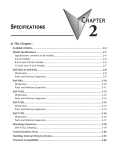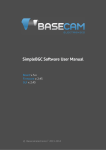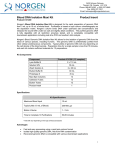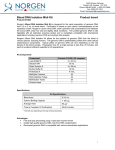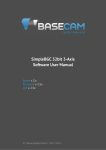Download Blood DNA Purification Kit - 30 mL - Protocol
Transcript
3430 Schmon Parkway Thorold, ON, Canada L2V 4Y6 Phone: 866-667-4362 (905) 227-8848 Fax: (905) 227-1061 Email: [email protected] Blood DNA Purification Kit Plus – 30mL Product Insert Product #52400 Norgen’s Blood DNA Purification Kit Plus – 30 mL provides a fast and simple procedure for purifying high molecular weight genomic DNA from up to 10 mL of blood. The kit allows for the isolation of genomic DNA from the blood of various species, including humans. Typical yields of genomic DNA will vary depending on the cell density of the blood sample. Preparation time for a single sample is about 60 minutes. Blood genomic DNA purified using Norgen’s kit is of the highest quality, and is compatible with a number of downstream applications including PCR, Southern Blot analysis, sequencing and microarray analysis. Purification is based on the lysis of red blood cells (RBC) using the Norgen’s RBC Lysis Solution followed by precipitating the white blood cells (WBC). Norgen’s Cell Lysis Solution and Proteinase K are then added to the WBC pellet to lyse the cells and remove proteins. Genomic DNA is then recovered by alcohol precipitation and resuspended in the DNA Rehydration Solution. The size of the purified blood genomic DNA is up to 200 kpb with a typical A260/A280 ratio of >1.7. Specifications Kit Specifications Minimum blood input 0.3 mL Maximum blood input Average Yield from 1 mL of whole blood 6 (7 x 10 white blood cells) DNA size 10 mL Average purity (OD260/280) >1.7 Time to Complete 10 Purifications 45-60 minutes (+ DNA rehydration) 24 g* Up to 200 kbp *Yield will vary depending on the type of blood processed Advantages Fast and simple processing DNA can be isolated and detected from as little as 300 L of blood Isolate high quality and high molecular weight genomic DNA Recovered genomic DNA is compatible with various downstream applications Kit Components Component RBC Lysis Solution Cell Lysis Solution Proteinase K DNA Rehydration Solution Product Insert Product #52400 100 mL 40 mL 2.5 mL 12 mL 1 1 Storage Conditions and Product Stability All solutions should be kept tightly sealed and stored at room temperature. These reagents should remain stable for at least 1 year in their unopened containers. The kit contains a readytouse Proteinase K solution, which is dissolved in a specially prepared storage buffer. The Proteinase K is stable for up to 1 year after delivery when stored at room temperature. To prolong the lifetime of Proteinase K, storage at 2–8°C is recommended. Precautions and Disclaimers This kit is designed for research purposes only. It is not intended for human or diagnostic use. Ensure that a suitable lab coat, disposable gloves and protective goggles are worn when working with chemicals. For more information, please consult the appropriate Material Safety Data Sheets (MSDSs). These are available as convenient PDF files online at www.norgenbiotek.com. The Cell Lysis Solution contains guanidinium salts, and should be handled with care. Guanidinium salts forms highly reactive compounds when combined with bleach, thus care must be taken to properly dispose of any of these solutions. Blood of all human and animal subjects is considered potentially infectious. All necessary precautions recommended by the appropriate authorities in the country of use should be taken when working with blood. Customer-Supplied Reagents and Equipment Benchtop microcentrifuge (variable speed, up 14,000 x g) or swing bucket centrifuge (≥ 2,000 x g) Micropipettors and pipette tips 1.5 mL sterile microcentrifuge tubes, 15 mL centrifuge tubes or 50 mL centrifuge tubes Isopropanol 70% ethanol (does not contain other substances such as methanol or methylethylketone) 56°C waterbath or incubator 65°C incubator Crushed ice º 37 C incubator (for blood containing Gram positive bacterial pathogens) Lysozyme (for blood containing Gram positive bacterial pathogens) Procedure Please check your microcentrifuge or centrifuge specifications to ensure that it is capable of the proper speeds. All centrifugation steps are performed at room temperature. The correct rpm can be calculated using the formula: RPM = RCF (1.118 x 10-5) (r) where RCF = required gravitational acceleration (relative centrifugal force in units of g); r = radius of the rotor in cm; and RPM = the number of revolutions per minute required to achieve the necessary g-force. 2 Flow Chart Procedure for Purifying Blood Genomic DNA using Norgen’s Blood DNA Purification Kit Plus – 30 mL Desired volume of Blood in the appropriate tube size Collect saliva sample into vials containing Lysis Solution Transfer Add K, incubate at Add Proteinase RBC Lysis Solution and mix, stand for 5 min. 55°C for let 1 hour. Add Purification Additive and Isopropanol. Collect saliva sample into vials containing Lysis Solution SPIN Transfer Decant supernatant, add Cell Transfer supernatant. Add K, incubate at LysisProteinase SolutionSolution and Add Binding 55°C for 1 hour. Add Purification Proteinase K, resuspend and incubateand at 56ºC (for 20-30 Additive Isopropanol. min) thenLysis 1 min on ice Collect saliva sample into vials containing Solution SPIN SPIN Transfer Bind Transfer supernatant. Add Proteinase K, incubate at 55°C for 1 hour. Add Purification Additive and Isopropanol. Collect saliva sample into vials containing Lysis Solution Add and invert to mix AddIsopropanol Binding Solution SPIN SPIN SPIN Transfer Wash twicesupernatant. with Transfer Bind Add Proteinase K, incubate at Wash Solution. Add and invert to mix Add70% Binding Solution 55°C for Ethanol 1 hour. Add Purification Dry Spin Additive and Isopropanol. Collect saliva sample into vials containing Lysis Solution SPIN SPIN SPIN SPIN Transfer Transfer supernatant. Wash twice with K, incubate at Bind Elute DNA with Dry, add DNA Add Proteinase Add Binding Solution Wash Solution. Rehydration Solution Elution Buffer 55°C for 1 hour. Add Purification and rehydrate Dry Spin and Isopropanol. Additive SPIN SPIN Pure Blood Genomic DNA SPIN SPIN Pure Saliva DNA Wash twice with Transfer Bind Elute DNAsupernatant. with Wash Solution. Add Binding Elution Buffer Solution Dry Spin SPIN SPIN SPIN 3 Volumes Required for Scaling Whole Blood Purification Protocols to Process Different Blood Input Volumes *Blood volume (µL) 300 3,000 10,000 1.5 15 50 RBC Lysis Solution (µL) 900 9,000 30,000 Cell Lysis Solution (µL) 300 3,000 10,000 Proteinase K (µL) 22.5 225 750 Isopropanol (µL) 375 3,500 11,000 70% ethanol (µL) 900 9,000 30,000 100 300 1,000 † Tube size (mL) ‡ DNA Rehydration Solution (µL) *To isolate DNA from different volumes of blood than shown above, use kit solution volumes that are proportional to the starting blood volume. † Use 50 mL centrifuge tube if the starting blood volume exceeds 3.5mL. ‡ Lower volumes can be used to obtain higher DNA concentration, however longer rehydration time may be required. Notes prior to use: Blood Sample: Fresh or frozen whole blood samples treated with the appropriate anticoagulant (EDTA, citrate or heparin) may be used. Better yield is obtained from fresh blood and EDTA is preferred for high molecular weight genomic DNA. Blood can be collected on the desired anticoagulant and stored at -80 before genomic DNA purification. Ensure that all solutions are at room temperature prior to use, and that no precipitates have formed. If necessary, warm the solutions and mix well until the solutions become clear again. Thaw frozen blood samples quickly at 37°C with gentle agitation and keep on ice before starting the purification procedures. Vortex Proteinase K before use. Prepare the required volume of 70% ethanol. Preheat water bath or incubator to 56°C. Preheat 65°C incubator for the final rehydration step. For blood containing Gram positive bacterial pathogens, prepare a 400 mg/mL stock 7 solution (approximately 1.7 x 10 units/mL) of lysozyme as per supplier's instructions. Vigorous handling of DNA during the different steps of the protocol can shear the DNA. Avoid vigorous vortexing and use gentle pipetting in all of the mixing and resuspension steps if higher molecular weight DNA is required. A. Purification Procedure for 300 µL Blood Sample 1. 2. 3. 4. 5. Add 900 µL of RBC Lysis Solution to a 1.5 mL microcentrifuge tube. Add 300 µL of whole blood, and mix by inverting 10 times. Incubate at room temperature for 3 minutes, and invert once during the incubation. Centrifuge for 5 minutes at 2,000 x g to pellet white blood cells. Discard the supernatant by pipetting, leaving approximately 50 µL of residual liquid. Make sure not to disturb the white blood cells pellet. Note: For DNA isolation from blood containing Gram positive bacterial pathogens, add 5 º µL of lysozyme (not provided) and mix well by pipetting. Incubate at 37 C for 1 hour (NOTE: incubation times may fluctuate between 0.5 and 2 hours depending on the bacterial strain being lysed). After incubation, proceed to Step 6. 4 6. Add 300 µL of Cell Lysis Solution. 7. Add 22.5 µL of Proteinase K (vortex Proteinase K before use). 8. Pipette gently to resuspend the pellet in the solutions. Make sure that the pellet is completely dispersed. 9. Incubate at 56ºC for 20 minutes. 10. Place the lysate tube in ice for 1 minute. 11. Add 375 µL of Isopropanol and invert 50 times to mix. DNA threads or clump may be visible after mixing. 12. Centrifuge for 1 minute at 14,000 x g. A white pellet of DNA may be visible. 13. Carefully discard the supernatant without disturbing the pellet. Invert the tube on clean absorbent paper for 1 minute to drain residual isopropanol. 14. Add 900 µL of 70% ethanol, and invert 10 times. 15. Centrifuge for 1 minute at 14,000 x g. 16. Carefully discard the supernatant. Invert the tube upside down on clean absorbent paper for 5 minutes to drain residual ethanol and air dry. Handle the tube carefully as the DNA pellet can dislodge. Make sure not to over dry the DNA. 17. Add 100 µL of DNA Rehydration Solution, and pipette gently to resuspend DNA. Note: For lower or higher DNA concentrations, the volume of DNA Rehydration Solution can be increased or decreased, respectively. 18. Incubate at 65ºC for 5 minutes to completely rehydrate DNA. Ensure that the DNA is completely rehydrated. Gentle pipetting as well as overnight incubation at room temperature may be used. Note: The prepared high yield DNA might be viscous due to the high concentration and molecular weight, which can affect DNA analysis. It is recommended to use a larger DNA Rehydration Solution volume and/or longer rehydration time with gentle pipetting to ensure that no aggregates are formed. B. Purification Procedure for 3 mL Blood Sample 1. 2. 3. 4. 5. Add 9 mL of RBC Lysis Solution to a 15 mL centrifuge tube. Add 3 mL of whole blood, and mix by inverting 10 times. Incubate at room temperature for 5 minutes, and invert at least once during the incubation. Centrifuge for 5 minutes at 2,000 x g to pellet white blood cells. Carefully discard the supernatant by pipetting or pouring, leaving approximately 200 µL of residual liquid. Make sure not to disturb the white blood cells pellet. Note: For DNA isolation from blood containing Gram positive bacterial pathogens, add º 20 µL of lysozyme (not provided) and mix well by pipetting. Incubate at 37 C for 1 hour (NOTE: incubation times may fluctuate between 0.5 and 2 hours depending on the bacterial strain being lysed). After incubation, proceed to step 6. 6. Add 3 mL of Cell Lysis Solution. 7. Add 225 µL of Proteinase K (vortex Proteinase K before use). 8. Pipette gently to resuspend the pellet into the added solutions. Make sure that the pellet is completely dispersed. 9. Incubate at 56ºC for 25 minutes. 10. Place the lysate tube in ice for 2 minutes. 11. Add 3.5 mL of Isopropanol and invert 50 times to mix. DNA threads or clump may be visible after mixing. 12. Centrifuge for 3 minutes at ≥ 2,000 x g. A white pellet of DNA may be visible. 13. Carefully discard the supernatant without disturbing the pellet. Invert the tube on clean absorbent paper for 1 minute to drain residual isopropanol. 14. Add 9 mL of 70% ethanol, and invert 10 times. 5 15. Centrifuge for 1 minute at ≥ 2,000 x g. 16. Carefully discard the supernatant. Invert the tube upside down on clean absorbent paper for 10 minutes to drain residual ethanol and air dry. Handle the tube carefully as the DNA pellet can dislodge. Make sure not to over dry the DNA. 17. Add 300 µL of DNA Rehydration Solution, and pipette gently to resuspend DNA. Note: For lower or higher DNA concentrations, the volume of DNA Rehydration Solution can be increased or decreased, respectively. 18. Incubate at 65ºC for 60 minutes to completely rehydrate DNA. Ensure that the DNA is completely rehydrated. Gentle pipetting as well as overnight incubation at room temperature may be used. Note: The prepared high yield DNA might be viscous due to the high concentration and molecular weight, which can affect DNA analysis. It is recommended to use a larger DNA Rehydration Solution volume and/or longer rehydration time with gentle pipetting to ensure that no aggregates are formed. C. Purification Procedure for 10 mL Blood Sample 1. 2. 3. 4. 5. Add 30 mL of RBC Lysis Solution to a 50 mL centrifuge tube. Add 10 mL of whole blood, and mix by inverting 10 times. Incubate at room temperature for 5 minutes, and invert at least once during the incubation. Centrifuge for 5 minutes at 2,000 x g to pellet white blood cells. Carefully discard the supernatant by pipetting or pouring, leaving about 200 µL of residual liquid. Make sure not to disturb the white blood cells pellet. Note: For DNA isolation from blood containing Gram positive bacterial pathogens, add º 50 µL of lysozyme (not provided) and mix well by pipetting. Incubate at 37 C for 1 hour (NOTE: incubation times may fluctuate between 0.5 and 2 hours depending on the bacterial strain being lysed). After incubation, proceed to step 6. 6. Add 10 mL of Cell Lysis Solution. 7. Add 750 µL of Proteinase K (vortex Proteinase K before use). 8. Pipette gently to resuspend the pellet into the added solutions. Make sure that the pellet is completely dispersed. 9. Incubate at 56ºC for 30 minutes. 10. Place the lysate tube in ice for 3 minutes. 11. Add 11 mL of Isopropanol and invert 50 times to mix. DNA threads or clump may be visible after mixing. 12. Centrifuge for 5 minutes at ≥ 2,000 x g. A white pellet of DNA may be visible. 13. Carefully discard the supernatant without disturbing the pellet. Invert the tube on a clean absorbent paper for 1 minute to drain residual isopropanol. 14. Add 30 mL of 70% ethanol, and invert 10 times. 15. Centrifuge for 2 minutes at ≥ 2,000 x g. 16. Carefully discard the supernatant. Invert the tube upside down on clean absorbent paper for 10 minutes to drain residual ethanol and air dry. Handle the tube carefully as the DNA pellet can dislodge. Make sure not to over dry the DNA. 17. Add 1 mL of DNA Rehydration Solution, pipette gently to resuspend DNA. Note: For lower or higher DNA concentrations, the volume of DNA Rehydration Solution can be increased or decreased, respectively. 18. Incubate at 65ºC for 60 minutes to completely rehydrate DNA. Ensure that the DNA is completely rehydrated. Gentle pipetting as well as overnight incubation at room temperature may be used. 6 Note: The prepared high yield DNA might be viscous due to the high concentration and molecular weight, which can affect DNA analysis. It is recommended to use a larger DNA Rehydration Solution volume and/or longer rehydration time with gentle pipetting to ensure that no aggregates are formed. Storage of DNA The purified DNA sample may be stored at 4°C for a few days. It is recommended that samples be placed at –20°C for long term storage or at -80°C for archival sample storage. 7 Troubleshooting Guide Problem Cells are not completely lysed Samples are not completely rehydrated Possible Cause Solution and Explanation Too many cells were used The protocol is optimized for a cell density of 7 x 6 10 white blood cells per 1 mL of blood. Exceeding the recommended input will increase the viscosity and the cells will clump due to incomplete lysis. More lysis solution will be required. To avoid this, cell counting of the blood sample is recommended. The lysate mixture was not completely mixed after the addition of the Cell Lysis Solution and Proteinase K Samples were not resuspended after adding the DNA Rehydration Solution Samples were not incubated at 65ºC after resuspending in the DNA Rehydration Solution Make sure to pipette well to resuspend DNA into the DNA Rehydration Solution. Avoid vigorous vortexing if higher molecular weight DNA is required Do not exceed the recommended air drying time. Over drying will slow down the rehydration step and more incubation time at 65 ºC (up to 1 hour) may be required. Make sure to incubate the sample at 65ºC for the recommended time. Up to 1 hour incubation at 65ºC can be used if the sample is not completely rehydrated. Protein carry over in the purified DNA Make sure not to exceed the recommended input amount of cells. Low input Count cells to ensure that your sample has a high enough amount of starting cells. DNA pellet over drying Incomplete lysis Low yield Incomplete rehydration High A260/A280 Make sure to completely mix the lysate by gentle pipetting. No cell clumps should be visible after mixing and the cell pellet should be completely dislodged. RNA contamination DNA degradation DNA size is less than 50 kbp DNA shearing Exceeding the recommended input will increase the viscosity and cells will clump due to incomplete lysis, resulting in a lower yield. To avoid this, cell counting of the blood sample is recommended. Do not over dry the DNA pellet before adding the DNA Rehydration Solution. Mix well to resuspend the DNA before incubating at 65ºC for the specified time. Up to 1 hour incubation at 65ºC may be used to ensure complete rehydration. RNase treatment of purified sample can be carried out to remove residual RNA. Blood samples should be stored at 4ºC for few days or at -20ºC if storage exceeds 5 days. Storage at -80°C is recommended for archival sample storage. Vigorous handling of DNA during the different steps of the protocol can shear the DNA. Avoid vigorous vortexing and use gentle pipetting in all of the mixing and resuspension steps. 8 Related Products Product # Blood Genomic DNA Isolation Micro Kit 52100 Blood Genomic DNA Isolation Mini Kit 46300 Blood Genomic DNA Isolation Midi Kit 51400 Blood Genomic DNA Isolation Maxi Kit 31200 Dried Blood Spot Genomic DNA Isolation Kit 36000 Technical Support Contact our Technical Support Team between the hours of 8:30 and 5:30 (Eastern Standard Time) at (905) 227-8848 or Toll Free at 1-866-667-4362. Technical support can also be obtained from our website (www.norgenbiotek.com) or through email at [email protected]. 3430 Schmon Parkway, Thorold, ON Canada L2V 4Y6 Phone: (905) 227-8848 Fax: (905) 227-1061 Toll Free in North America: 1-866-667-4362 © 2013 Norgen Biotek Corp. PI52400-2 9










